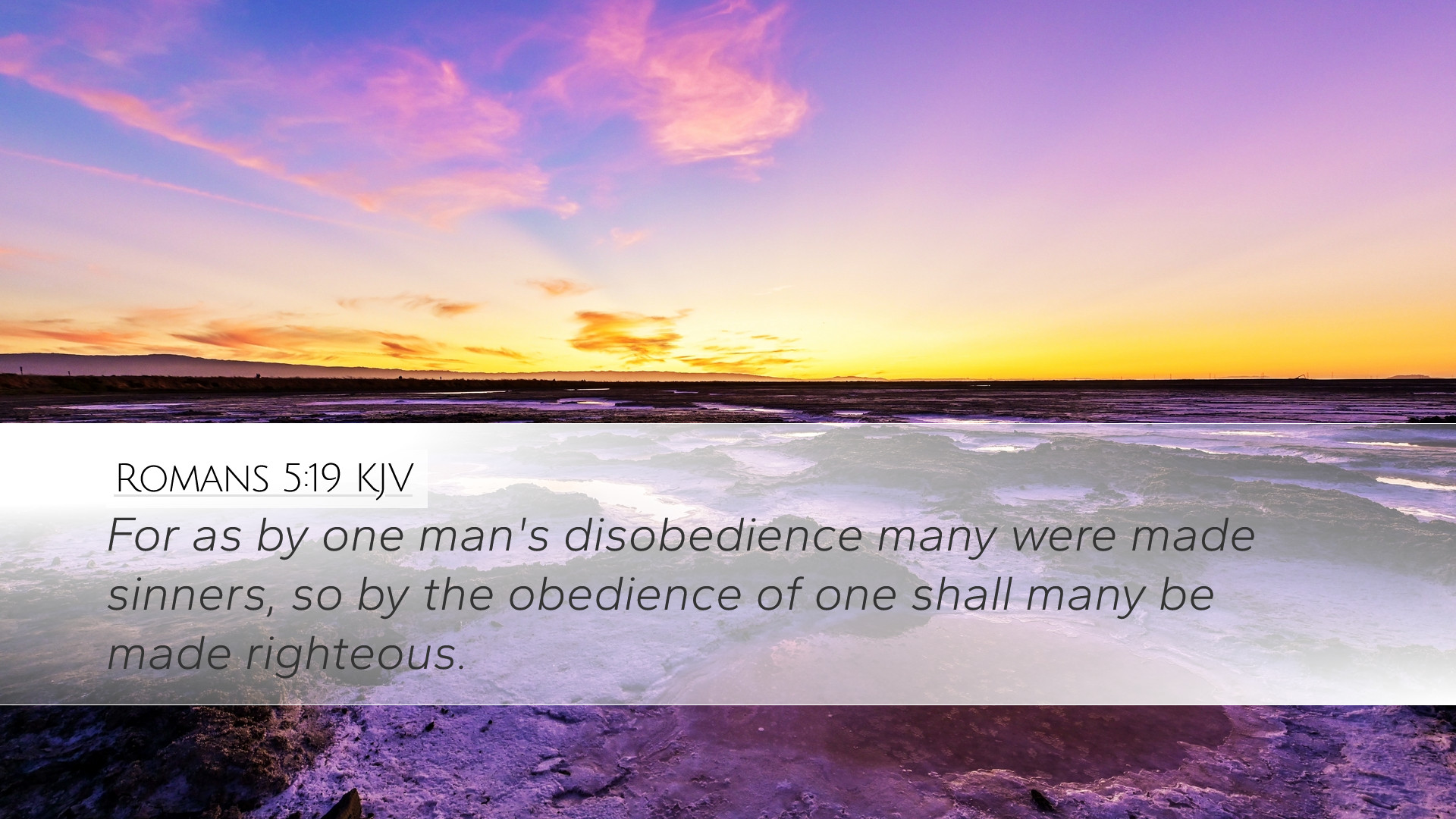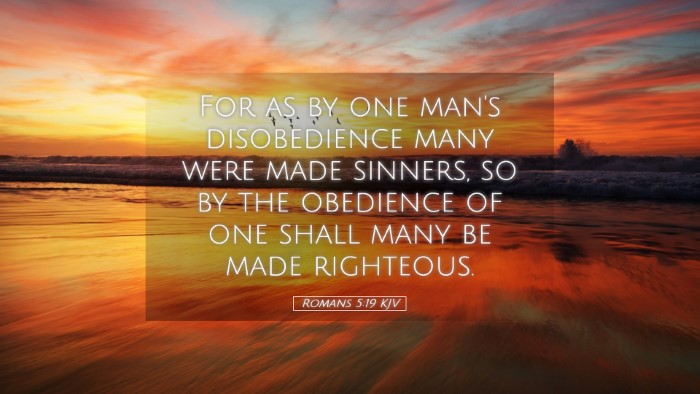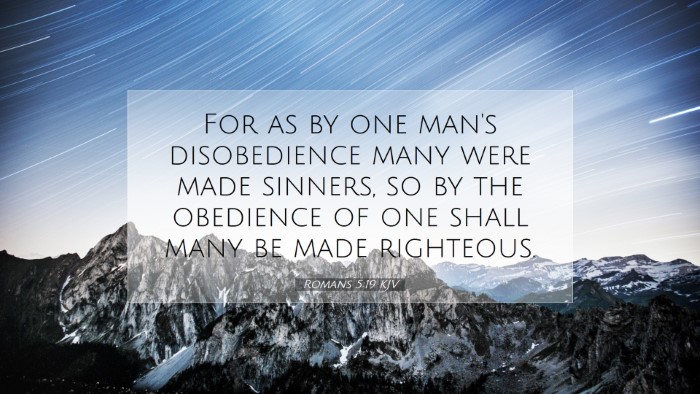Old Testament
Genesis Exodus Leviticus Numbers Deuteronomy Joshua Judges Ruth 1 Samuel 2 Samuel 1 Kings 2 Kings 1 Chronicles 2 Chronicles Ezra Nehemiah Esther Job Psalms Proverbs Ecclesiastes Song of Solomon Isaiah Jeremiah Lamentations Ezekiel Daniel Hosea Joel Amos Obadiah Jonah Micah Nahum Habakkuk Zephaniah Haggai Zechariah MalachiRomans 5:19
Romans 5:19 KJV
For as by one man's disobedience many were made sinners, so by the obedience of one shall many be made righteous.
Romans 5:19 Bible Commentary
Commentary on Romans 5:19
Verse: "For as by one man's disobedience many were made sinners, so by the obedience of one shall many be made righteous." (Romans 5:19)
Introduction
The verse Romans 5:19 serves as a pivotal point in Paul’s exposition of justification by faith. It encapsulates the theological dichotomy between the consequences of Adam’s transgression and the redemptive obedience of Christ. This commentary draws upon insights from the works of notable theologians such as Matthew Henry, Albert Barnes, and Adam Clarke to elaborate on its profound implications.
Contextual Analysis
Within the broader context of Romans 5, Paul contrasts the effects of sin introduced through Adam with the grace and righteousness brought forth through Jesus Christ. This verse is foundational for understanding the doctrine of original sin and the concept of federal headship.
Commentary Insights
Matthew Henry's Perspective
Matthew Henry emphasizes the essential relationship between Adam’s fall and Christ’s redemption. He highlights that Adam, as the representative of humanity, brought sin and death into the world. His disobedience brought about a state of sinfulness in which humanity finds itself. However, through the obedience of Christ, many are offered a path to righteousness. Henry asserts that this obedience encompasses Christ's life, death, and resurrection, providing the means for believers to be justified before God.
Albert Barnes' Interpretation
Albert Barnes focuses on the implication of “many” in this verse. He indicates that Paul is not suggesting universal salvation but rather notes that through one man (Christ), many may attain righteousness, contrasting it with how sin spread through one man (Adam). Barnes argues that the term "made sinners" signifies a change in status rather than inherent sinful nature. He expounds upon the certainty of righteousness available to believers, emphasizing the transformative power of Christ's obedience as foundational for Christian belief and practice.
Adam Clarke's Exegesis
Adam Clarke provides a rich linguistic analysis, noting the Greek terms used in the original text. He draws attention to the contrasts inherent in the phrase, “disobedience” versus “obedience,” signifying the moral and spiritual states of humanity. Clarke argues that the “many” who are made righteous refer to all who believe, accentuating the inclusive nature of Christ’s sacrifice. He also brings out the idea that the righteousness offered through Christ is an act of grace, not dependent on human merit.
Theological Reflections
This verse raises critical theological questions regarding human nature, sin, and redemption. It presents a duality that invites believers to reflect on their state before God—both as recipients of sin through Adam and as beneficiaries of grace through Christ. The theological ramifications extend into discussions around federal headship, the nature of original sin, and the efficacy of Christ’s atoning work.
- Original Sin: The doctrine that asserts humanity inherits sinfulness from Adam’s fall.
- Federal Headship: The belief that Adam's actions represent all of humanity, establishing a relational dynamic between sin and subsequent generations.
- Grace and Righteousness: The transformative power of Christ's obedience is extended to those who place their faith in Him, demonstrating the essence of salvation.
Practical Applications
For pastors, theologians, and students, Romans 5:19 serves as a reminder of the importance of sound doctrine in teaching and preaching. Understanding this verse informs the believer’s identity in Christ and highlights the need for a response to God’s gift of righteousness. It compels believers toward evangelism, showcasing the necessity of proclaiming the good news of Jesus Christ as the antidote to the sin that permeates humanity.
- Preaching Focus: Emphasize the contrast between Adam's disobedience and Christ's obedience in sermons to illustrate the nature of sin and salvation.
- Teaching Curriculum: Incorporate this verse into doctrinal studies on sin, salvation, and Christology for a comprehensive theological education.
- Pastoral Care: Offer assurance to congregants struggling with guilt and shame, reinforcing the message of grace and righteousness available in Christ.
Conclusion
Romans 5:19 stands as a monumental text within Paul’s epistle, painting a vivid picture of humanity’s plight due to Adam's sin while simultaneously offering hope through the obedience of Christ. The insights from Matthew Henry, Albert Barnes, and Adam Clarke enhance our understanding of this profound truth, urging all Christians to embrace the transformative power of divine grace. As one contemplates the implications of this verse, may it fuel both personal faith and collective mission in the endeavor of sharing the gift of righteousness through Christ alone.


